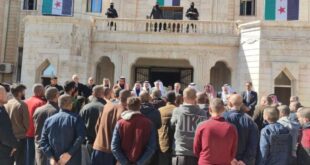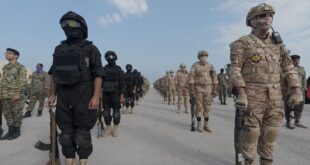Turkey has deployed more troops to northwestern Syria as a deterrent against any major offensive by Russian-backed Syrian forces, ahead of a meeting between the Turkish and Russian leaders next week.
Ankara is concerned that an escalation in Idlib, the last rebel stronghold in northwest Syria, would push a new wave of refugees toward Turkey, which has been hosting about 4 million Syrians since the start of the conflict a decade ago.
Turkish President Recep Tayyip Erdogan is expected to raise this issue during his meeting with his Russian counterpart Vladimir Putin on Sept. 29. To what extent Russia’s position will find a common ground with Ankara is still unclear.
Last week, during a meeting between Putin and Syrian President Bashar Assad, the Russian president criticized the presence of foreign troops without a UN mandate.
Three Turkish soldiers were killed on Sept. 11 in Idlib as the Syrian regime forces have intensified their attacks.
“Russia is frustrated with Turkey’s unwillingness to expel Hayat Tahrir Al-Sham from Idlib and is using its warplanes as well as Syrian ground forces to put pressure on Turkey,” Samuel Ramani, a tutor of politics and international relations at the University of Oxford, told Arab News.
Russia is holding Turkey to its 2018 commitment to separate radicals such as HTS, the dominant group in Idlib, from other rebels in Idlib. But Ankara rejects claims that it has failed to deliver on its promise.
HTS has been distancing itself from Al-Qaeda and rebranding itself as a moderate rebel group — an image makeover before the international community. But it is still designated by the US, the UN Security Council and Turkey as a terror group.
“Turkey does not view a limited escalation of this kind as a major cross-border threat but would certainly fear a refugee influx if Assad and Putin carry out a much larger assault on Idlib, which mirrored the events of late 2019 and early 2020,” Ramani said. “So Turkey’s troops are there to deter such a scenario from taking place and ensure that the status quo holds until the Putin-Erdogan meeting.”
However, Syrian Foreign Minister Faisal Mekdad has urged Turkey to withdraw its forces from Syrian soil immediately and said he considered Turkish presence an act of occupation.
Ramani said that in the past Putin-Erdogan meetings have often reduced the conflict in Syria, for example after the Operation Peace Spring in October 2019 and Operation Spring Shield in March 2020: “So the hope is that this will happen again.”
On Sept. 24, Erdogan said he expects Russia to change its approach toward Syria as the Syrian regime poses a threat to Turkey along the southern border.
At the UN General Assembly on Tuesday, Erdogan addressed the Syrian crisis, saying that “as a country that protected human dignity in the Syrian crisis, we no longer have the potential nor the tolerance to absorb new immigration waves.”
Oytun Orhan, coordinator of Syria studies at the Ankara think tank ORSAM, said Turkey attaches importance of retaining its place in Syrian game.
“If it completely withdraws from the region, it will stay out of the endgame and will not have a say when a political process in Syria begins,” Orhan told Arab News.
According to Orhan, Turkey is also concerned about the presence of foreign fighters and radical elements in Idlib.
“If there were a regime offensive, they would be likely to flock toward the Turkish border and would pose a security threat not only to Turkey but to the global community,” he said.
Experts say that although it exposes the limits of their cooperation, Turkish-Russian relations will likely survive this latest round of escalation as both sides have too much to lose if their relationship is damaged.
Orhan says the deployment of Turkish troops ahead of Putin-Erdogan meeting is a symbolic move to gain leverage at the negotiation table.
“Although Russia supports the Assad regime, it also takes notice of Turkish presence in the region, as well as of cooperation in the fields of energy and defense industry. It doesn’t want to undermine them, yet tries to use Idlib card as a bargaining chip each time there is a crisis in bilateral ties,” he said.
Russia reportedly conducted about 200 aerial attacks against Idlib in September. Some of the attacks targeted zones close to Turkey’s military posts in the province. Turkey has about 80 military bases and observation posts in Idlib.
“Although Turkish and Syrian intelligence agencies have met in the past, Russia has been pushing Turkey for years to open a diplomatic communication channel with the Syrian regime. But Ankara is not willing to take this step. I expect that Erdogan-Putin meeting will de-escalate the tension in Idlib, but both leaders will test their determination before sitting at the negotiation table,” Orhan said.
 Eurasia Press & News
Eurasia Press & News



